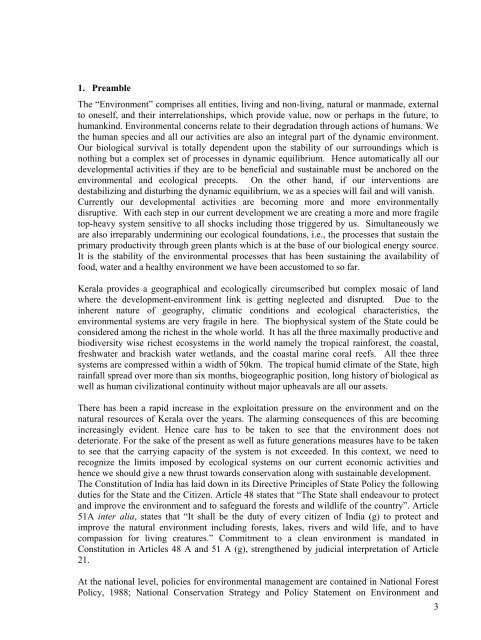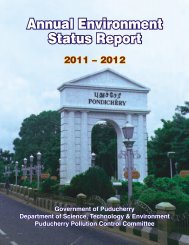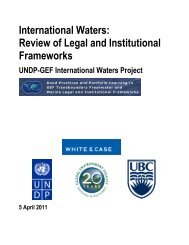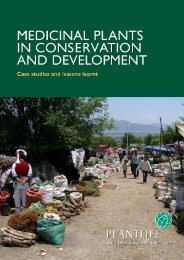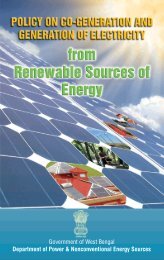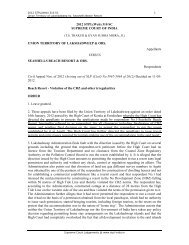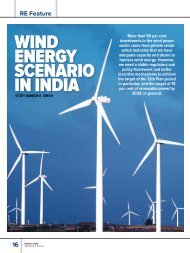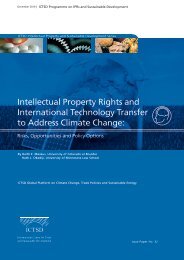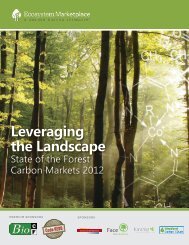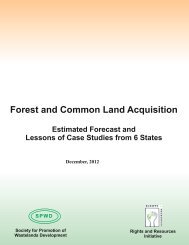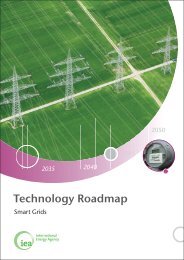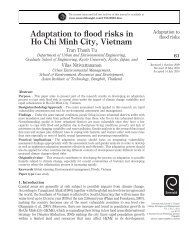DRAFT ENVIRONMENT POLICY - India Water Portal
DRAFT ENVIRONMENT POLICY - India Water Portal
DRAFT ENVIRONMENT POLICY - India Water Portal
You also want an ePaper? Increase the reach of your titles
YUMPU automatically turns print PDFs into web optimized ePapers that Google loves.
1. PreambleThe “Environment” comprises all entities, living and non-living, natural or manmade, externalto oneself, and their interrelationships, which provide value, now or perhaps in the future, tohumankind. Environmental concerns relate to their degradation through actions of humans. Wethe human species and all our activities are also an integral part of the dynamic environment.Our biological survival is totally dependent upon the stability of our surroundings which isnothing but a complex set of processes in dynamic equilibrium. Hence automatically all ourdevelopmental activities if they are to be beneficial and sustainable must be anchored on theenvironmental and ecological precepts. On the other hand, if our interventions aredestabilizing and disturbing the dynamic equilibrium, we as a species will fail and will vanish.Currently our developmental activities are becoming more and more environmentallydisruptive. With each step in our current development we are creating a more and more fragiletop-heavy system sensitive to all shocks including those triggered by us. Simultaneously weare also irreparably undermining our ecological foundations, i.e., the processes that sustain theprimary productivity through green plants which is at the base of our biological energy source.It is the stability of the environmental processes that has been sustaining the availability offood, water and a healthy environment we have been accustomed to so far.Kerala provides a geographical and ecologically circumscribed but complex mosaic of landwhere the development-environment link is getting neglected and disrupted. Due to theinherent nature of geography, climatic conditions and ecological characteristics, theenvironmental systems are very fragile in here. The biophysical system of the State could beconsidered among the richest in the whole world. It has all the three maximally productive andbiodiversity wise richest ecosystems in the world namely the tropical rainforest, the coastal,freshwater and brackish water wetlands, and the coastal marine coral reefs. All thee threesystems are compressed within a width of 50km. The tropical humid climate of the State, highrainfall spread over more than six months, biogeographic position, long history of biological aswell as human civilizational continuity without major upheavals are all our assets.There has been a rapid increase in the exploitation pressure on the environment and on thenatural resources of Kerala over the years. The alarming consequences of this are becomingincreasingly evident. Hence care has to be taken to see that the environment does notdeteriorate. For the sake of the present as well as future generations measures have to be takento see that the carrying capacity of the system is not exceeded. In this context, we need torecognize the limits imposed by ecological systems on our current economic activities andhence we should give a new thrust towards conservation along with sustainable development.The Constitution of <strong>India</strong> has laid down in its Directive Principles of State Policy the followingduties for the State and the Citizen. Article 48 states that “The State shall endeavour to protectand improve the environment and to safeguard the forests and wildlife of the country”. Article51A inter alia, states that “It shall be the duty of every citizen of <strong>India</strong> (g) to protect andimprove the natural environment including forests, lakes, rivers and wild life, and to havecompassion for living creatures.” Commitment to a clean environment is mandated inConstitution in Articles 48 A and 51 A (g), strengthened by judicial interpretation of Article21.At the national level, policies for environmental management are contained in National ForestPolicy, 1988; National Conservation Strategy and Policy Statement on Environment and3


